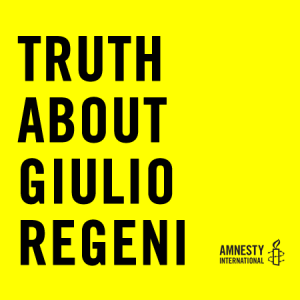Regeni’s Case: Martin Schulz Calls on Egypt to Cooperate
External Relations 22 April 2016“On Regeni’s case, the Egyptian authorities have failed the test so far. The European Union and the European Parliament will continue to be vigilant, calling on the Egyptian authorities to show transparency and to cooperate. Giulio Regeni was an Italian citizen but also a European one. And the European Union supports Italy in its quest for truth,” said Martin Schulz, President of the European Parliament in his keynote address at the University for Foreigners of Siena, after he received an honorary degree today.
Giulio Regeni, a 28-year-old Italian post-graduate student, disappeared in Cairo last January. His dead body was found on 3 February beside a road on the outskirts of Cairo, reportedly with marks of torture on him.
Any involvement in Regeni’s death have been repeatedly denied by Egyptian officials who – shortly after his body was found – suggested the Italian researcher was the victim of a car accident.
Later on, in March, they declared they had discovered Regeni’s bag after a shootout with a criminal gang. Police also suggested Regeni might have been victim of this gang, since its members had in the past posed as policemen.
A couple of weeks later, Italy recalled its ambassador to Egypt for consultations since Egyptian investigators in Rome had failed to hand over all their evidence to the Italians.
However, three Egyptian intelligence officials and three police sources told Reuters on their own that the police had custody of Regeni at some point before he died.
Why Was Giulio Regeni in Egypt?
“What happened to Giulio Regeni was truly appalling and we’re deeply worried that the Egyptian authorities are attempting to cover up his death,” said Liesbeth Ten Ham, Amnesty International’s chair in Cambridge, where a rally and photo-call were organized.
Regeni was in Egypt in order to do fieldwork for his doctoral research at the University of Cambridge when he was abducted. His research focused on trade unions in Egypt, especially street vendors. In the aftermath of the 2011 uprising, police often used vendors to attack protesters or to act as informers. Therefore, his activities had raised the suspicions of police, as a security source told Reuters, since the trade union movement is regarded as the origin of the 2011 uprising and the last bastion of dissent under Sisi’s crackdown.
In a resolution, the European Parliament strongly condemned the torture and assassination of the Italian researcher and called on the Egyptian authorities to provide their Italian counterparts with all the documents and information necessary to enable a swift, transparent and impartial joint investigation and make every effort “to bring the perpetrators of the crime to justice as soon as possible.
Justice for Giulio for all Egypt’s other disappearance victims
“Tragically enough, Giulio is one of many people to have disappeared and to have wound up dead in Sisi’s Egypt. We need justice for Giulio, and justice for all Egypt’s other disappearance victims.”, added Ten Ham.
Under the government of President Abdel Fattah el-Sisi, a lot of people have been “disappeared” by the security forces in the past year alone, reports Amnesty International. According to several reports, many – including of students – have undergone torture while taken into custody by the Egyptian security services. Torture ranges from be beatings, to electric shocks and the use of stress positions. As a result of torture, there were also a series of deaths in custody, due to a lack of access to urgently-needed medical care.
International outrage sparked by Regeni’s death. Amnesty International Italy launched a “Truth about Giulio Regeni” campaign (Verità per Giulio Regeni).
“I adhere to the campaign Truth about Giulio Regeni,” said President Schulz, “Whoever has tortured and murdered him was at the opposite extreme of Giulio Regeni, acting in favour of obscurantism, ignorance and opposition to every forms of dialogue.”


